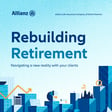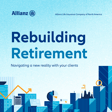
Episode 1.01 Moshe Milevsky on the new retirement reality
Moshe Milevsky is a professor of finance at York University in Canada. He’s an author and leading authority on the intersection of wealth management, financial mathematics, and insurance.
Professor Milevsky talks about the fundamental shifts in retirement planning and why it’s no longer simply a math problem to be solved, how he feels about the 4% withdrawal strategy for retirement income, and why he doesn’t like the idea of choosing a retirement date.
Go to Moshe Milevsky's website.
....
The Allianz consumer study referenced in this episode is the Allianz 2023 Annual Retirement Study, an online survey conducted in February and March 2023 with a nationally representative sample of 1,000 individuals age 25+ in the contiguous U.S. with an annual household income of $50k+ (single) / $75k+ (married/partnered) OR investable assets of $150k+.
Allianz Life Insurance Company of North America (Allianz) and Allianz Life Financial Services LLC are not affiliated with our podcast guest. The guest's website is being provided as a service to you. Opinions expressed by the podcast guests are not necessarily those of Allianz or its affiliates. Please note that the information and opinions are provided by third parties and sources believed to be reliable, but accuracy and completeness cannot be guaranteed. The information is not intended to be used as the sole basis for financial decisions, nor should it be construed as advice designed to meet the particular needs of an individual’s situation.
Allianz Life Insurance Company of North America has been keeping its promises since 1896 by helping Americans achieve their retirement income and protection goals with a variety of annuity and life insurance products.
Allianz Life Insurance Company of North America (Allianz) does not provide financial planning services.
This content is for general educational purposes only. It is not intended to provide fiduciary, tax, or legal advice and cannot be used to avoid tax penalties; nor is it intended to market, promote, or recommend any tax plan or arrangement. Allianz Life Insurance Company of North America, its affiliates, and their employees and representatives do not give legal or tax advice or advice related to Social Security or Medicare. Customers are encouraged to consult with their own legal, tax, and financial professionals for specific advice or product recommendations, or the Social Security Administration (SSA) office for their particular situation.
Diversification does not ensure a profit or protect against loss.
Guarantees are backed by the financial strength and claims-paying ability of Allianz Life Insurance Company of North America. Registered index-linked annuity (RILA) guarantees do not apply to the performance of the variable subaccounts, which will fluctuate with market conditions.
Products are issued by Allianz Life Insurance Company of North America. Registered index-linked annuities (RILAs) are distributed by its affiliate, Allianz Life Financial Services, LLC, member FINRA, 5701 Golden Hills Drive, Minneapolis, MN 55416-1297. 800.542.5427 www.allianzlife.com
This content does not apply in the state of New York.
For financial professional use only – not for use with the public.

